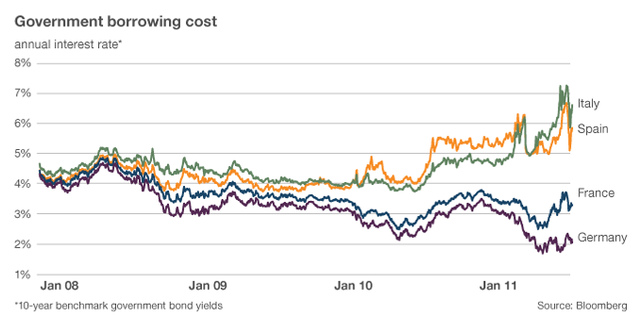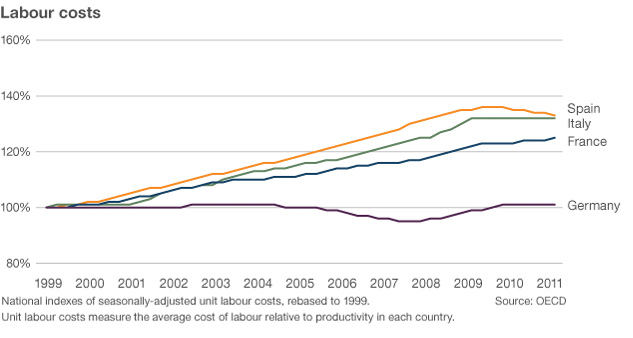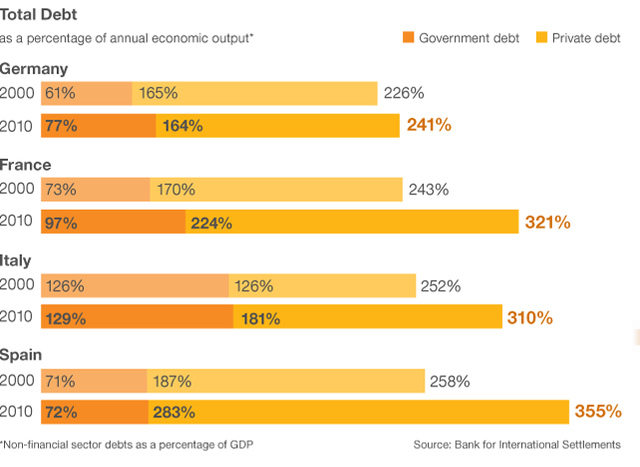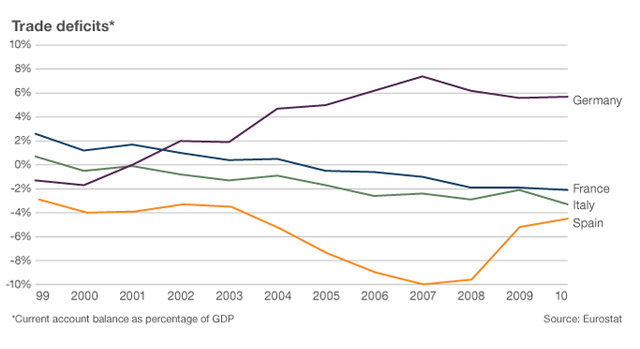The eurozone has agreed a new "fiscal compact"
Eurozone leaders have agreed to a tough set of rules - insisted on by Germany - that will limit their governments' "structural" borrowing (that is, excluding any extra borrowing due to a recession) to just 0.5% of their economies' output each year. It will also limit their total borrowing to 3%. These rules are supposed to stop them accumulating too much debt, and make sure there won't be another financial crisis.
But didn't they already agree to this back in the '90s?
Hang on a minute. They agreed to exactly the same 3% borrowing limit back in 1997, when the euro was being set up. The "stability and growth pact" was insisted on by German finance minister Theo Waigel (centre of image). What happened?
So who kept to the rules?
Italy was the worst offender. It regularly broke the 3% annual borrowing limit. But actually Germany - along with Italy - was the first big country to break the 3% rule. After that, France followed. Of the big economies, only Spain kept its nose clean until the 2008 financial crisis; the Madrid government stayed within the 3% limit every year from the euro's creation in 1999 until 2007. Not only that - of the four, Spain's government also has the smallest debts relative to the size of its economy. Greece, by the way, is in a class of its own. It never stuck to the 3% target, but manipulated its borrowing statistics to look good, which allowed it to get into the euro in the first place. Its waywardness was uncovered two years ago.
But the markets have other ideas
So surely Germany, France and Italy should be in trouble with all that reckless borrowing, while Spain should be reaping the rewards of its virtue? Well, no. Actually Germany is the "safe haven" - markets have been willing to lend to it at historically low interest rates since the crisis began. Spain on the other hand is seen by markets as almost as risky as Italy. So what gives?
So what really caused the crisis?
There was a big build-up of debts in Spain and Italy before 2008, but it had nothing to do with governments. Instead it was the private sector - companies and mortgage borrowers - who were taking out loans. Interest rates had fallen to unprecedented lows in southern European countries when they joined the euro. And that encouraged a debt-fuelled boom.
Good news for Germany...
All that debt helped finance more and more imports by Spain, Italy and even France. Meanwhile, Germany became an export power-house after the eurozone was set up in 1999, selling far more to the rest of the world (including southern Europeans) than it was buying as imports. That meant Germany was earning a lot of surplus cash on its exports. And guess what - most of that cash ended up being lent to southern Europe.
...bad news for southern Europe
But debts are only part of the problem in Italy and Spain. During the boom years, wages rose and rose in the south (and in France). But German unions agreed to hold their wages steady. So Italian and Spanish workers now face a huge competitive price disadvantage. Indeed, this loss of competitiveness is the main reason why southern Europeans have been finding it so much harder to export than Germany.
...and a nasty dilemma
So to recap, government borrowing - which has ballooned since the 2008 global financial crisis - had very little to do with creating the current eurozone crisis in the first place, especially in Spain (Greece's government is the big exception here). So even if governments don't break the borrowing rules this time, that won't necessarily stop a similar crisis from happening all over again. Spain and Italy are now facing nasty recessions, because no-one wants to spend. Companies and mortgage borrowers are too busy repaying their debts to spend more. Exports are uncompetitive. And now governments - whose borrowing has exploded since the 2008 financial crisis savaged their economies - have agreed to drastically cut their spending back as well.
Source URL: http://www.bbc.co.uk/news/business-16301630




